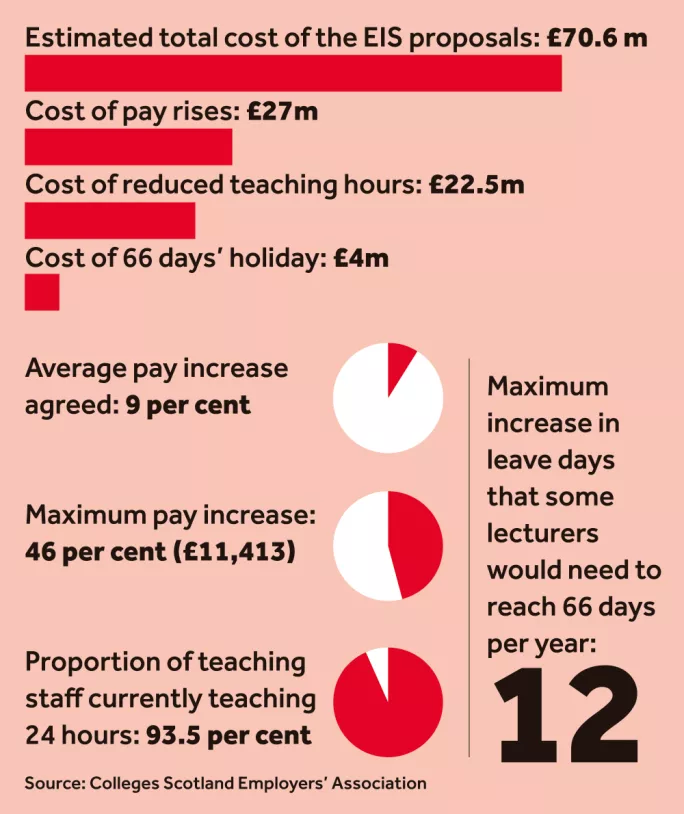Lecturers’ salary demands ‘could boost pay by 46%’

A £70 million pay deal being demanded by college lecturers would provide salary hikes of up to 46 per cent - and as many as 12 extra days of holiday - according to a document seen by Tes Scotland.
The Colleges Scotland Employers’ Association briefing projects that the pay claim proposed by the EIS teaching union would provide pay increases of up to £11,413 by April 2019. The union has challenged the figures.
Details of the claim for college lecturers have emerged at a time when school teachers have yet to agree a deal for 2017-18, having received a 1 per cent pay rise in 2016-17 and 1.5 per cent the year before.
The EIS is balloting members of its Further Education Lecturers’ Association on a possible strike over what it sees as the non-delivery of a 2016 agreement on lecturers’ pay and conditions. The ballot closes on 10 April.
The union claims that managers are reneging on an agreement to place all teaching staff on a pay scale towards the highest level of pay, which is £40,026. But college leaders argue that an agreement is needed on changes to terms and conditions, such as teaching hours and annual leave, before the pay deal can be introduced.
Salary hikes cost big
According to Colleges Scotland, the pay increase alone would mean an average salary rise of 9 per cent but, for many, the increase could be significantly above that and would cost the sector £27 million.
Lecturers at North Highland College, who currently receive the lowest annual salary, at £24,601, would receive an increase of £11,413 - a pay rise of 46 per cent over two years - to move them towards the top of the scale, the briefing document reveals.
However, while the EIS is demanding that all lecturers should receive 66 days’ annual leave and teach 21 hours per week, managers have offered 56 days’ leave and 25 hours’ teaching time as part of their proposal. They claim that the union’s plans could not be funded.
According to calculations set out in the document, if all lecturers were to teach for 21 hours per week - compared with the 24 hours that are currently provided by most staff - this could cost colleges £22.5 million per year.

Increasing annual leave to 66 days per year, meanwhile, would mean more annual holiday for 93.5 per cent of lecturers - and in a small number of cases, by 12 days per year. The cost of this, the briefing projects, could be up to £4 million.
The briefing outlines additional costs associated with training staff to gain formal lecturing qualifications, and a further £9 million for the reduction of teaching hours for promoted teaching staff and for migrating them towards one of three salary points.
The cost of the proposals has been estimated at £70 million, taking the bill for the sector’s teaching staff from £247 million to £318 million.
Collective bargaining
One reason for the current pay disparities is that national collective bargaining was only reintroduced in 2013. Until then, individual colleges agreed their own pay and conditions with staff. In some cases, lecturers negotiated more leave in return for smaller salaries.
Shona Struthers, chief executive of the Colleges Scotland Employers’ Association, said that the cost of the EIS demands were “significant, and simply provide more money for less work and increased holidays”.
The full proposals would require colleges to employ about 300 additional lecturing staff, and were “not financially sustainable for the publicly funded college sector”, she said. “The demands can only mean less teaching time for students and a higher cost to the taxpayer.”
It was important to read the “actual words” in last year’s agreement, she said; strike action would also “imperil” the previous pay deal.
A spokesman for the EIS said employers were reneging on an agreement to deliver harmonised pay: “It seems the employers want to sort out terms and conditions before delivering on the pay. However, this is not - and never has been - part of the agreement.”
He added that colleges were “effectively attempting a form of blackmail to force the EIS into accepting new terms and conditions”.
“Colleges Scotland is now saying that the £40,000 [salary] is not guaranteed if lecturers go out on strike,” he added.
A spokesman said that the employers’ proposals could in fact reduce the number of staff currently delivering in the sector “to the detriment of staff and students alike”; they would also lead to almost all staff having fewer holidays and longer working hours, “in other words, to pay for their equal pay agreement reached last year”.
He added: “The bigger question is why did Colleges Scotland agree to a base salary last year if it could not deliver it?”
A Scottish government spokesperson said that the administration “would encourage the colleges and unions to continue to work constructively for a solution in order that the sector can focus on delivering the high-quality education that its students expect”.
The spokesperson added: “Disputes of this kind are in no one’s interest, least of all students and their families.”
You need a Tes subscription to read this article
Subscribe now to read this article and get other subscriber-only content:
- Unlimited access to all Tes magazine content
- Exclusive subscriber-only stories
- Award-winning email newsletters
Already a subscriber? Log in
You need a subscription to read this article
Subscribe now to read this article and get other subscriber-only content, including:
- Unlimited access to all Tes magazine content
- Exclusive subscriber-only stories
- Award-winning email newsletters